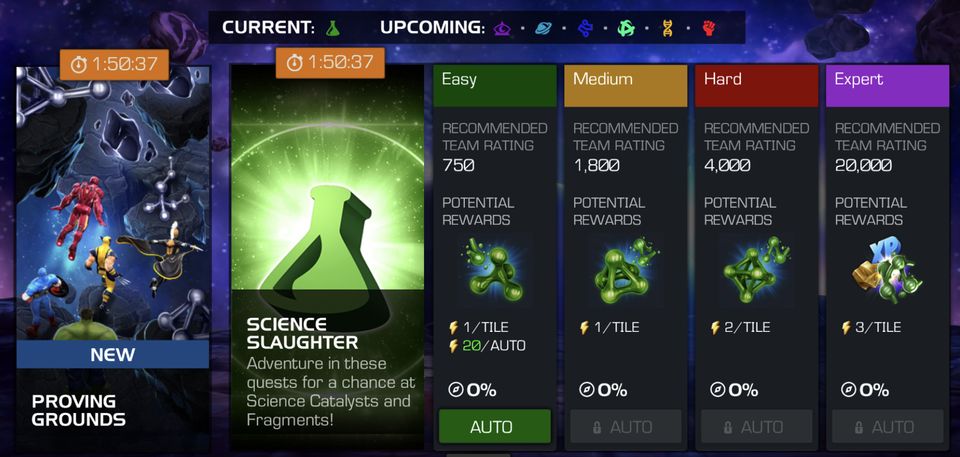Daily Events in Free-to-play Games


Developers often implement daily login rewards to incentivize players to return on a daily basis. Some games build up task lists that populate with new unique tasks every morning. Do these five tasks to open the golden crate.
These become pretty boring and meaningless because
Players are working towards generic rewards, often ones that they’d receive from playing the actual game.
The activity related to the daily routine has an element of randomness. “Play 5 missions in the story mode” doesn’t surface a lot of meaningful action for the player. It’s like you’re working on the assembly line, working on things that have zero meaning but give you some rewards for your effort.
There’s got to be more meaning in your events. To achieve meaning, the developers should look at incentives that push the player to choose the activities that they participate in which have the right rewards for this particular player.
Marvel: Contest of Champions uniquely caters to a daily routine. The daily events are tied to the metagame to amplify the reasons to come back daily.
MCOC’s metagame revolves around collecting Marvel characters and making them stronger to beat more challenging content, like missions tied to a linear story or daily, weekly or monthly events. Some are done alone, but some missions are alliance activities. An alliance is MCOC’s social group, aka. Guild or clan.
The daily event in Marvel: Contest of Champions
Each day, the game brings up a new daily event. On Monday, you collect yellow items from completing the daily event-related missions. Yellow is the color of the Mutants, well known as a subtype of Marvel characters, including the X-Men (Wolverine, Rogue, Cyclops, etc.) The yellow items can be used as upgrade currency. Granted, the game gives out generic upgrade currency from all over the place. Still, when you use a specific character type currency (yellow upgrade currency for yellow characters), you get a bonus of 20% to the character’s stats to increase per upgrade.

Here are the two daily quest types available. Both give players to upgrade items. The “Proving Grounds” gives out generic upgrade items, whereas the “Science Slaughter” gives out green upgrade items.
Variability of daily events
The player’s journey in a game like MCOC can take ten years. You start with one or two-star Champion characters and gradually progress towards three and four-star ones. As you move forward, the game goes something unique. In these daily events, the player can choose which difficulty.

If they’ve collected and upgraded a bunch of three-star solid champions, they might opt for the Medium daily quest. The rewards will be better: you’ll get upgrade items that are much more powerful and will double the upgrade of a champion compared to using an item you’d get from the Easy daily quest.
Besides this variability, player autonomy and enjoyment from making exciting choices. The player will feel that they can now do the Easy and the Medium ones, and once they get a bit stronger, perhaps in a few months, they will be able to start doing the hard ones. Who knows, in a few years, they could play the Expert mode already.
What does this do for your game?
The MCOC event model opens up a plethora of possibilities for live ops in several kinds of games.
Here are a few example games where this model could be applied.
Clash Royale meta
The key to utilizing the daily quest system is to incorporate types of content that you are upgrading. In Clash Royale, cards are characters and spells. In Golf Clash, it’s golf clubs and balls. In F1 Manager, it’s drivers and car parts.
The Clash Royale meta-type distinguishes its collectible content by rarity and utility. I believe that isn’t enough to cater to a daily quest system such as the one in MCOC.
One way to group cards and make a choice convenient for the players is to visualize the whole week’s event calendar—which items are features like rewards for each day during the week—this way the player can set short-term goals. On Wednesday, the Prince card is available as a reward from the event.
Some games like Golf Clash, which utilize the Clash Royale meta, have particular subtypes for the collectible items. Like on Saturday, you could be getting some Rough Iron clubs.
Merge Mansion meta
When you have a merge game, and you’d want to apply the MCOC daily quests, here’s what you’d do:
Since the game doesn’t have much character or item progression but focuses on Mansion-progression, the events should feature items representing a premise at the Mansion. Every day, you’d have daily merge boards show up, with a specific grid for certain types of items being featured in that daily merge event.
You might ask: isn’t the player already fixing up the Mansion in the main game? Yes, they are, so you want your events to have their way of speeding up progression. Completing the daily event could give out a crate of higher-level items, and the crate would be placed into a unique inventory of crates collected in the events.
The loop of the event: complete a daily event, gain valuable items and speed up the main game.
Brawl Stars meta
Brawl Stars is a MOBA game that focuses a lot on upgrading individual characters. But if you build out daily events for particular characters, you end up quickly going down the route of having too long of a cycle for your daily events.
Another reason why individual character daily events won’t work is that Brawl Stars characters are heavily balanced based on rarity, meaning many people have all the common characters. Still, only a few have the Legendary ones.
To incorporate the MCOC daily quests into a Brawl Stars-like game, I’d look into character secondary upgrade paths like the gadget upgrades.
What’s up next?
Stay tuned to the next part in this article series, coming out soon.





